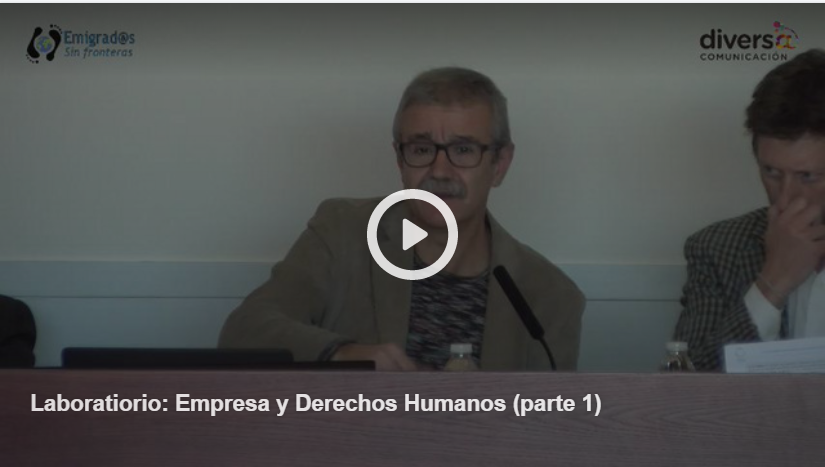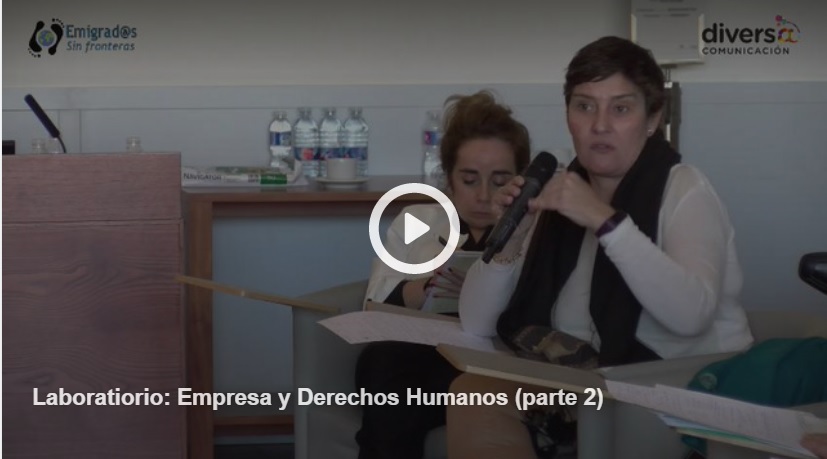Horizontal dialogues (6 interventions) and debates:
- Joxerramon Bengoetxea (01:25- 08:38): Coordinador EHU Gune de UPV.
– Explores problems of social interest from a cooperative and multidisciplinary point of view.
– Uses the systems theory to explain the interrelation between peace, economy and business.
- Izaskun Alonso (09:07- 23:02): The Rights Factory.
– Explains the necessity of a legal framework and regulations so that companies protect human rights.
– Says that there is a lack of teaching for companies and public administration in order to build awareness.
- Gonzalo Fernández (23:16- 31:06): OMAL.
Need to regulate supporting companies, since businesses are naturally profit oriented and thus won´t automatically contribute to fulfilling Human Rights.
- Eduardo Giménez (31:17- 40:22): Ingeteam.
– Companies search for ways to distinguish themselves from others.
– Boosting corporate social responsibility is const-intensive which leads to an imbalance in competiveness
– The regulations contribute positively to gaining strength/wealth/worth and a better organization inside ones company.
- Leyre Madariaga (40:38- 52:30): Acción Exterior del Gobierno Vasco.
– A Basque Framework of regulation without an international framework might be counter productive.
– Sensibility concerning CSR is growing.
- Silvia Gregorio (53:00- 01:07:35): Coordinadora de ONGD (cooperación al desarrollo).
– The dependency of undeveloped countries on rich countries for survival and raising profits is one of the causes of the capitalist system.
- Dani Gutiérrez (01:01:45- 01:07:35): Ongi Etorri Errefuxiatuak.
– The absence of an ethical consciousness in the Basque government concerning weapon fabrication in Euskadi.
- Eva Silvan (01:08:25- 01:14:12): Save the Children.
– Businesses are no agent of cooperation but of economical development.
– The necessity not to separate but rather cooperation of private businesses, NGOs and the third sector to boost Human Rights.
- Joseba Ossa (01:14:23- 01:19:31): Bakun.
– Justified civil disobedience.
– Cooperation between social movements, institutions, companies…
- Leyre Madariaga (01:19:36- 01:22:32): Acción Exterior Gobierno Vasco.
– Emphasizing how not to fall into degenerative dynamics.
– Confirms that there are contradictions in the institution (arms trade)
- Pasqualino Colombaro (01:22:53- 01:26:25): Independent Investigator.
– The importance of syndicates as associations of workers against the strength of the corporate.
The most efficient ways to recruit syndicates are to establish rights and protections.
- Josu Urrutia (01:26:38- 01:29:31): Mundukide.
– Underlines the importance of social economy in the debate.
- Esther Guerrero (01:29:39- 01:33:47): UNICEF.
– Reiterates the topic of cooperation for a sustainable development and the impact of companies on guaranteeing children’s rights.
- Jokin Alberdi (01:34:02- 01:37:12): Gernika Gogoratuz.
– There is a necessity of a legislative development
– There are laws that already bring a regulatory framework but they are not applied.
- Ester Muñoz (01:37:16- 01:39:28): Instituto de Derechos Humanos Pedro Arrupe (UD).
– The right for human rights finds only a few ways of effective application.
- Daniel Nina (01:39:33- 01:44:53): Professor de Administración de Empresas y Derecho en la Universidad de Puerto Rico.
– Redirecting the debate out of esoteric positions.
– Necessity to rethink the production processes at work, but not only in the arms industry but for all companies.
- Dani Gutiérrez (01:45:14- 01:46:17): Ongi Etorri Errefuxiatuak.
– Points out, that the concept of Peace Economy is not only concerned with the process of production but also with the product itself.
- Antonio Vives (01:47:03- 01:52:21): Professor at the University of Stanford.
– If one really wants to regulate they need an environment that allows them to regulate regulations.
– The differences in a company´s responsibilities and what and how they produce is either in a responsible or harmful way.
- Daniel Nina (01:52:23- 01:54:15): Professor at the University of Stanford.
– Counters the last statements of Antonio Vives.
- Juan Hernández (01:57:11- 02:03:01): Professor UPV/ investigador OMAL.
– Points out that there are regulations about the rights of transnational companies but not of their obligations.
- Antonio Vives (02:03:05- 02:04:07): Professor at the University of Stanford.
– Speaks of the accusations against CSR when in reality it’s the companies´ functionaries´ fault.
Individual criminal responsibility
- Orencio Vázquez (02:04:08- 02:08:27): Observatorio de CSR.
– Access to remediation
– Fundamental human rights should always have higher priority than the dictation of costs and efficiency.
- Joseba Ossa (02:08:40- 02:11:01): Bakun.
– The lack of syndicats.
- Joseba Ossa (02:08:40- 02:11:01): Bakun.
– Negative thoughts on proposals like the treaty of Paris which has only poor impact if the hegemonic power stays within the oil companies.
- Antonio Vives (02:1330- 02:15:53): Professor at the University of Stanford.
– Necessity of moving toward renewable energy although changes of such magnitude take a long time.
- Juan Hernández (02:15:56- 02:18:00): Professor UPV/ investigador OMAL.
– The way towards a civilization “Crack”
– Talks about the idea that we live in a stystem with problems to reproduce the cycle of capital due to financialization.
- Daniel Nina (02:18:01- 02:21:43): Professor Universidad de Puerto Rico.
– The necessity of a dialogue roadmap.
– The loss of value in a changing world.
- Antonio Vives (02:21:44- 02:23:09): Professor at the University of Stanford.
– The change to renewable energies must not be abrupt because that would resonate in economical, social and political consequences.
- Orencio Vázquez (02:23:16- 02:24:53): Observatorio CSR.
– There is no sufficient impulse concerning the change of energy.
– The institutions have the power to augment the offers of this kind, so that there would be more demand. But they don´t do it.
- Antonio Vives (02:25:00- 02:26:40): Professor at the University of Stanford.
– Clarification about the monetary support that Tesla receives.
- Esther Guerrero (02:26:58- 02:29:07): UNICEF.
– Recommendation for the third sector for a sustainable development.
- Juan Hernández (02:29:09- 02:30:36): Professor UPV/ investigador OMAL.
– Mechanisms of double asccusations for companies that violate international laws.
– Explanation of a mechanism of extraterritorial jurisdiction.
- Antonio Vives (02:30:45- 02:31:58): Professor at the University of Stanford.
– Importance of the third sector in giving information to the public (to voice their problems).
- Eva Silvan (02:32:03- 02:33:19): Save the Children.
– Looking for realized proposals according to the new legislation.
- Juan Hernández (02:22:24- 02:34:58): Professor UPV/ investigador OMAL.
– Example Catalonia: Establishment of public mechanisms for denunciation and/or regulation for Catalan transnational companies.
- Daniel Nina (02:35:00- 02:38:10): Professor Universidad de Puerto Rico.
– Answers to Juan Hernández
– Supports the regulated economic movements as it is important for the population’s well-being.
- Iban Askasibar (02:38:10- 02:41:49): Fundación Ayuda en Acción.
– Impossibility of representing civil and human right in companies or economic missions because of a conflict of interests.
- Maria Oianguren (02:49:02- 02:55:23): Gernika Gogoratuz.
– Conclusions and possible ways in the future.



